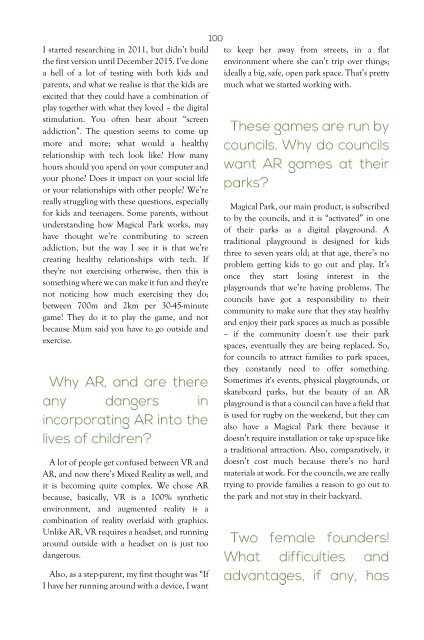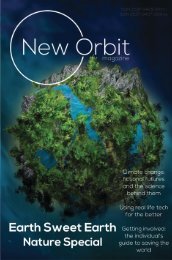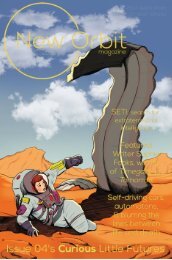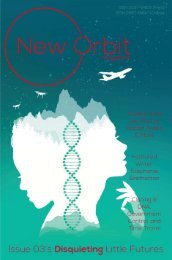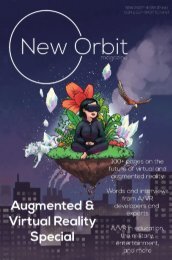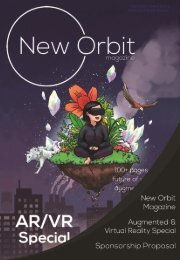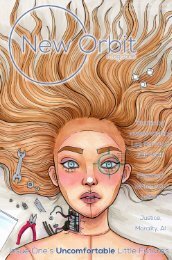Feb 2018 v01 online
((Incomplete formatting))
((Incomplete formatting))
You also want an ePaper? Increase the reach of your titles
YUMPU automatically turns print PDFs into web optimized ePapers that Google loves.
I started researching in 2011, but didn’t build<br />
the first version until December 2015. I’ve done<br />
a hell of a lot of testing with both kids and<br />
parents, and what we realise is that the kids are<br />
excited that they could have a combination of<br />
play together with what they loved – the digital<br />
stimulation. You often hear about “screen<br />
addiction”. The question seems to come up<br />
more and more; what would a healthy<br />
relationship with tech look like? How many<br />
hours should you spend on your computer and<br />
your phone? Does it impact on your social life<br />
or your relationships with other people? We’re<br />
really struggling with these questions, especially<br />
for kids and teenagers. Some parents, without<br />
understanding how Magical Park works, may<br />
have thought we’re contributing to screen<br />
addiction, but the way I see it is that we’re<br />
creating healthy relationships with tech. If<br />
they're not exercising otherwise, then this is<br />
something where we can make it fun and they're<br />
not noticing how much exercising they do;<br />
between 700m and 2km per 30-45-minute<br />
game! They do it to play the game, and not<br />
because Mum said you have to go outside and<br />
exercise.<br />
A lot of people get confused between VR and<br />
AR, and now there’s Mixed Reality as well, and<br />
it is becoming quite complex. We chose AR<br />
because, basically, VR is a 100% synthetic<br />
environment, and augmented reality is a<br />
combination of reality overlaid with graphics.<br />
Unlike AR, VR requires a headset, and running<br />
around outside with a headset on is just too<br />
dangerous.<br />
to keep her away from streets, in a flat<br />
environment where she can’t trip over things;<br />
ideally a big, safe, open park space. That’s pretty<br />
much what we started working with.<br />
Magical Park, our main product, is subscribed<br />
to by the councils, and it is “activated” in one<br />
of their parks as a digital playground. A<br />
traditional playground is designed for kids<br />
three to seven years old; at that age, there’s no<br />
problem getting kids to go out and play. It’s<br />
once they start losing interest in the<br />
playgrounds that we’re having problems. The<br />
councils have got a responsibility to their<br />
community to make sure that they stay healthy<br />
and enjoy their park spaces as much as possible<br />
– if the community doesn’t use their park<br />
spaces, eventually they are being replaced. So,<br />
for councils to attract families to park spaces,<br />
they constantly need to offer something.<br />
Sometimes it's events, physical playgrounds, or<br />
skateboard parks, but the beauty of an AR<br />
playground is that a council can have a field that<br />
is used for rugby on the weekend, but they can<br />
also have a Magical Park there because it<br />
doesn’t require installation or take up space like<br />
a traditional attraction. Also, comparatively, it<br />
doesn’t cost much because there’s no hard<br />
materials at work. For the councils, we are really<br />
trying to provide families a reason to go out to<br />
the park and not stay in their backyard.<br />
Also, as a step-parent, my first thought was “If<br />
I have her running around with a device, I want


